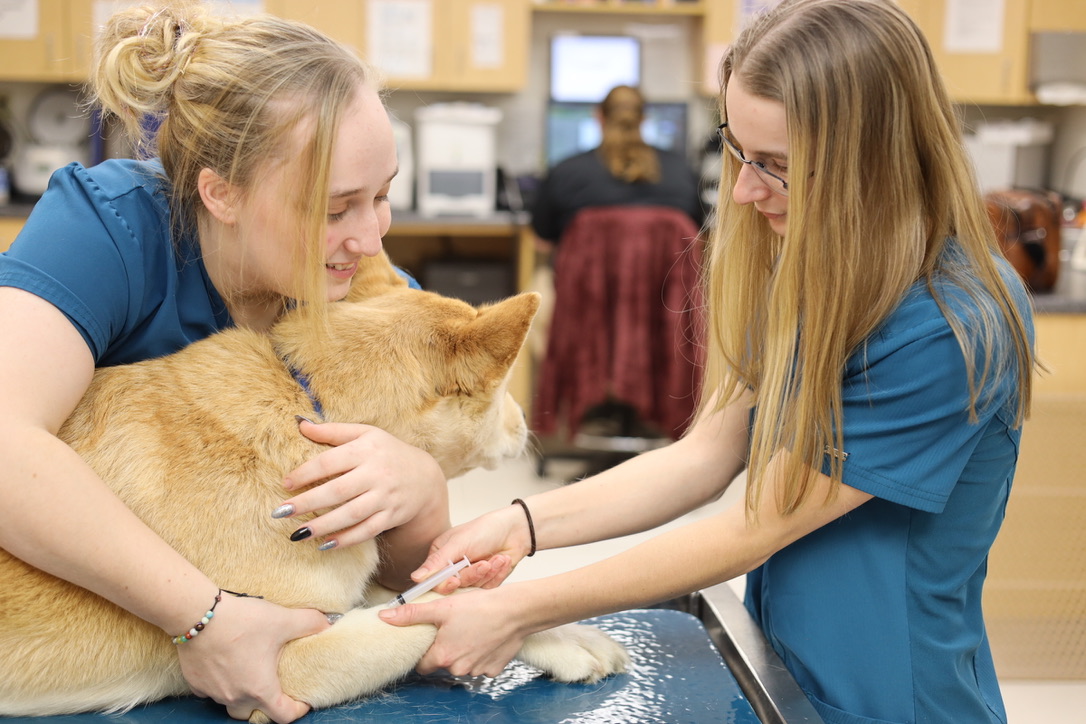Veterinary Orthopedics & Sports Medicine
Accepting Referrals from Elkins and Surrounding Area in West Virginia
 Orthopedic problems can result in pain and decreased performance. Our veterinarians will evaluate your pet’s orthopedic problem carefully, whether an injury to the bone, ligament, or joint. The evaluation begins with a thorough physical examination, including observation of posture and gait.
Diagnostic tests such as digital x-rays, musculoskeletal ultrasound may be conducted. Advanced medical treatment such as joint injections and regenerative medicine treatments (stem cell, IRAP, and PRP) are available. Advanced surgical treatment is also offered by our veterinarians. Ultimately, our goal is to get your pet back to normal performance and pain free.
We routinely care for all kinds of orthopedic injuries including bone fractures, tendon and ligament injuries, muscle strains and sprains, arthritis, and developmental orthopedic conditions.
Orthopedic problems can result in pain and decreased performance. Our veterinarians will evaluate your pet’s orthopedic problem carefully, whether an injury to the bone, ligament, or joint. The evaluation begins with a thorough physical examination, including observation of posture and gait.
Diagnostic tests such as digital x-rays, musculoskeletal ultrasound may be conducted. Advanced medical treatment such as joint injections and regenerative medicine treatments (stem cell, IRAP, and PRP) are available. Advanced surgical treatment is also offered by our veterinarians. Ultimately, our goal is to get your pet back to normal performance and pain free.
We routinely care for all kinds of orthopedic injuries including bone fractures, tendon and ligament injuries, muscle strains and sprains, arthritis, and developmental orthopedic conditions. Sports Medicine and Regenerative Medicine
- Stem Cell
- Platelet Rich Plasma
- IRAP therapy
- Elbow luxation or
- Elbow subluxation
- Elbow Medial or lateral collateral ligament desmitis
- Elbow dysplasia
- Elbow arthritis
- Bicipital bursitis / Bicep tendonitis
- Ununited anconeal process
- Fragmented coronoid process
- Cruciate ligament injuries (ACL or CCL ruptures and partial tears)
- Medial Patellar luxation
- Cranial Cruciate ligament disease (partial or complete)
- Extracapsular CCL Repair
- Hip dislocation
- Hip Dysplasia
- Femoral head and neck excision
- Osteochondritis dissecans (OCD)
- Joint dislocations and hyperextension injuries
- Limb Amputation
- Toe Amputation
- Intramedullary bone pinning
- External fixation
- Casting / Splinting
PennHIP and OFA-Certified Veterinarian
Canine Hip Dysplasia (CHD) is the most common inherited joint condition affecting large dogs. Responsible breeders have worked hard to identify and eliminate this painful and degenerative condition by removing affected dogs from the breeding program. Hip Dysplasia commonly affects breeds such as:
- Golden Retrievers
- Labradors
- German Shepherds
- Rottweilers
- Akitas
PennHip Evaluation
This accurate method is now the gold standard used to predict the onset of canine hip dysplasia, as well as osteoarthritis. The test involves a series of x-rays used to measure laxity of the hip joints according to the distraction index (DI). The test follows strict scientific protocol and has been peer-reviewed and well-researched. All measurements are based on precision calculations and objective observations. All veterinarians participating in the PennHIP program must be trained and certified to follow protocol and ensure data accuracy.
How is the PennHIP Evaluation Performed?
The patient must be sedated for the examination, which consists of three carefully collected x-ray views designed to measure the laxity of the hip joint. PennHIP evaluations may be performed on patients who are at least 16 weeks old. Restrictions on performing the evaluation prohibit females who have recently whelped, been in heat, or who are currently lactating. If your patient is a breeding female, please contact us to determine when the optimal time for testing will be. Our staff members will provide details and eligibility factors. Allegheny Veterinary Services is the only practice within a 90-mile radius whose staff are certified to provide the PennHIP evaluation.
OFA Genetic Testing for Dysplasia, Heart and Orthopedic Diseases
Allegheny Veterinary Services provides Canine Orthopedic Foundation for Animals (OFA) Certification for our patients. This series of genetic tests are available for breeders and should be performed before breeding commences. The purpose of the testing is to reduce the incidence of heritable diseases throughout the canine population. Genetic testing enables you to make informed decisions as a responsible dog breeder. Specific tests are recommended for each breed based on the incidence of specific health conditions that each is known to affect the breed. Learn more about the testing available by breed at OFA’s website.
If you would like to schedule an OFA evaluation for hip dysplasia, your dog must be at least two years of age. Please note that breeding females are ineligible to be tested if within 30 days of estrus (“heat”), which typically occurs twice per year for many breeds. All patients must be sedated during the x-rays necessary to predict orthopedic disease.







